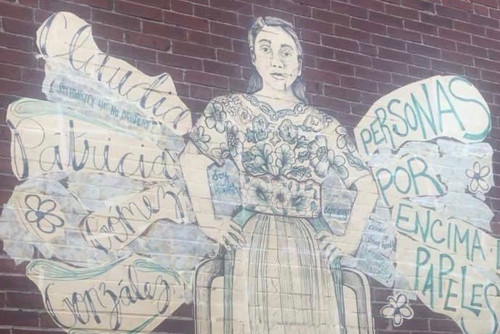
By Hazel Denother
When renovating the Spanish program last year, the foreign language professors at Lindenwood University wanted to shape the degree in a way that would lead their students to future success. They wanted their students’ language skills to continue to serve them outside the classroom, and they hoped that students would feel capable and confident in their Spanish abilities when they moved beyond Lindenwood’s halls.
The faculty crafted a program with a unique new component that they believed would be valuable to Spanish students; to earn their degrees, Spanish students must now engage in experiential learning in the form of either studying abroad or completing Spanish internships. Though this is only the third semester that this updated Spanish program has been in place, students have already been making a steady impact on the community through their internships, approaching each new opportunity with enthusiasm and determination. Students are accomplishing great things in the St. Charles and St. Louis communities while getting the opportunity to use their Spanish in professional settings.
Dr. Núñez-Betelu, Spanish professor and coordinator of the new Spanish internship program, is pleased with what her students have accomplished so far, and she points out that there are many benefits to completing a Spanish internship concurrently with one’s studies. “You’re still coming to class, you’re still learning, but at the same time, you’re getting a little bit of experience,” she explains. “And given that there are so many Spanish speakers around here now, being able to communicate with them is something that’s going to help….This gives you the experience of working in a place where you use Spanish and meeting people who speak Spanish.” In order to obtain credit for a Spanish internship, students must complete a minimum of 105 hours of work throughout the semester, and they need to speak Spanish at least 75% of the time that they are working. Dr. Núñez-Betelu says this experience “makes what [students] are studying more real.”
Lindenwood senior Malachi Cecil spent the last two semesters interning at Refugio, an immigrant community in St. Louis, and he says that his work there was extremely rewarding. During his internship experience, he helped people navigate the immigration system, and his responsibilities included providing interpretation services to people in healthcare and courtroom settings and connecting immigrants to local community resources. Cecil states, “My favorite part of the internship was being able to be present in the community in a way that I had not been and learning from the people I worked with. It was an eye-opening experience in many ways.”
Cecil feels that his experience with Refugio has had a major influence on his language skills. “This internship definitely impacted my Spanish in ways that classroom experience alone could not have. First of all, just the amount of time that I was speaking and listening to Spanish was so much more than is possible in a classroom. There were no ways to get around using Spanish,” he explains. “It also gave me experience using Spanish under pressure (for example, in the emergency room), which made using Spanish in other circumstances much less intimidating.” Furthermore, he feels that his internship helped him to grow as a person. “This experience definitely increased my linguistic and cultural appreciation. Simply being much more present in the community inevitably leads to much more cultural appreciation, and this is true in my case for sure.”
Samantha Byrne, a senior double-majoring in Spanish and Public Health, is doing an internship at STL Juntos this semester. Through this organization, Byrne acts as a liaison between food providers and underprivileged members of the local Hispanic community. She also helps distribute food to people in need and uses her Spanish to communicate with families who come to the organization for assistance. She enjoys being able to interact directly with the community in her role, and she is grateful for this opportunity to learn more about the Hispanic and LatinX cultures.
Byrne has also enjoyed being able to use her Spanish without worries about academic expectations holding her back. She says, “Having an internship has forced me to step outside of my comfort zone and encouraged me to speak with people outside of classrooms, where I feel tied to my grades….I feel more free to speak, especially to people I am serving.” She has had the chance to get to know Spanish speakers in a real-world setting, and she has witnessed some of the struggles that underprivileged Hispanic families endure in the community. She feels that this experience has been invaluable for both of her majors. “The internship has shown me that there are many gaps in the healthcare system that leave poorer communities even more in need….It has made me more aware that there is so much work to be done for those struggling in the lower-income population, especially the Hispanic community.” She explains that this role has been motivating for her, and she hopes to continue striving to make a difference in the community and helping people in need beyond this internship experience.
During internships, students often have to use their Spanish skills in unfamiliar situations, and facing these initial linguistic challenges forces them to become better speakers. Malachi Cecil agrees that this was true of his experience. “I was constantly being pushed to the edge of my language ability, especially when interpreting at the hospital and court. I also had a lot of trouble speaking Spanish on the phone,” he says. “I have gotten a lot more comfortable with all of these specific situations, and just in general my Spanish is much better than it was. I am just generally much more comfortable operating in Spanish than I was before the internship.”
Under Dr. Núñez-Betelu’s direction, this program is creating a bridge between Lindenwood University and the local community, and Dr. Núñez-Betelu hopes that these relationships will only grow stronger with time. She says, “One of our goals...is that the community knows that Lindenwood is a place where they can find people who can help them and [the community also knows] that they are welcome in our community and that we are here for them,” she says, “because we know that they are here for us, too.” So far, local Hispanic and LatinX organizations have been impressed by the work that Lindenwood students are doing in their internships. Dr. Núñez-Betelu says that she has received overwhelmingly positive feedback from the interns’ supervisors, and the organizations are enthusiastic about continuing their connections with the university and hosting more Lindenwood interns. The program has been a smashing triumph so far, and the Spanish faculty foresee it continuing to grow and thrive in the years to come.

The Linden Gold
The Linden Gold is a student operated organization focusing on promoting the academic success and achievements of Lindenwood. Through stories about alumni, current students, and faculty alike, The Linden Gold strives to engage with the St. Charles Community and showcase the unique greatness of Lindenwood.












